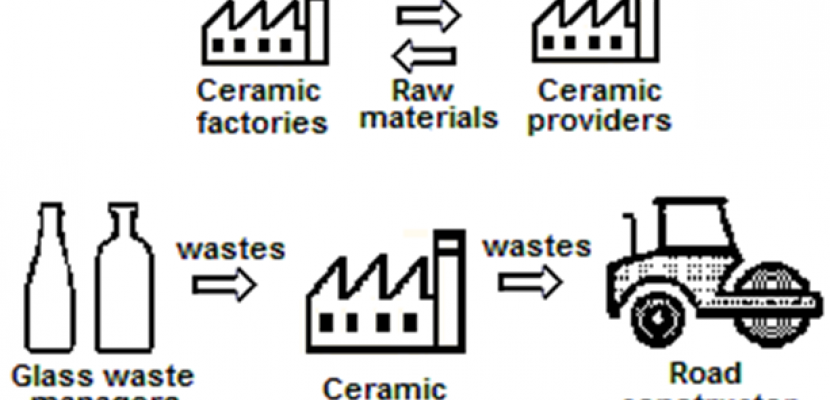Image

Symbiosis practices in ceramic sector
Published on 07 May 2018

Spain
Comunitat Valenciana
This is the good practice's implementation level. It can be national, regional or local.
About this good practice
Spain is the main European ceramic producer and the second largest exporter. Most of the ceramic factories in Spain are located in Castellón (94% of the National output and 81% of the sector companies) (Almost 250 companies locatedd in an area of 6632 km2). This geographical concentration constitutes a clear example of the organization of the productive activity in an industrial district.
Ceramic industry has 2 main wastes
- Sludges
- Ceramic waste
Annual amount of wastes generated ranges from 63.000 to 104.000 tn/year of wet sludges and from 31.500 to 52.000 tn/year of dry sludges.
Ceramic sludges can be recycled by manufacturers of atomised products (ceramics raw material providers) in order to produce new raw material.
Ceramic waste can be recycled in other sectors, for instance as a filling material in road construction.
Furthermore wastes from other activities such glass wastes can be also used as raw material for manufacturers of frits, enamels, and ceramic pigments.
Other synergies are also possible such as the use of ashes from electrics production plants as raw materials in ceramic process.
This symbiosis process has been generated in a spontaneously way, in the ceramic tile sector in Castellón (Spain).
Industrial symbiosis process in Castellon has emerged and reinforced by the existence of a strong commercial relationship among companies (providers and clients).
Ceramic industry has 2 main wastes
- Sludges
- Ceramic waste
Annual amount of wastes generated ranges from 63.000 to 104.000 tn/year of wet sludges and from 31.500 to 52.000 tn/year of dry sludges.
Ceramic sludges can be recycled by manufacturers of atomised products (ceramics raw material providers) in order to produce new raw material.
Ceramic waste can be recycled in other sectors, for instance as a filling material in road construction.
Furthermore wastes from other activities such glass wastes can be also used as raw material for manufacturers of frits, enamels, and ceramic pigments.
Other synergies are also possible such as the use of ashes from electrics production plants as raw materials in ceramic process.
This symbiosis process has been generated in a spontaneously way, in the ceramic tile sector in Castellón (Spain).
Industrial symbiosis process in Castellon has emerged and reinforced by the existence of a strong commercial relationship among companies (providers and clients).
Resources needed
It's convenient to make a list of available resources (Wastes) and a list of companies needs in order to find matches.
In some cases it will be necessary to modify the industrial process in order to facilitate the symbiosis.
Cost avoided: 100 € - 160 € / ton of waste management
In some cases it will be necessary to modify the industrial process in order to facilitate the symbiosis.
Cost avoided: 100 € - 160 € / ton of waste management
Evidence of success
A network of by-products has been implemented within the ceramic an related sectors. The main wastes that can be recycled are: enamel sludges, polishing sludges, frit wastes, kiln filter wastes, fired tiles waste.
One single company was able to recycle over 19000 tones of non fired tiles in 2016.
The symbiosis process has produced economic savings on raw materials.
Furthermore symbiosis has led to significant reduction of environmental impacts, such as reducing the amount of waste to landfill
One single company was able to recycle over 19000 tones of non fired tiles in 2016.
The symbiosis process has produced economic savings on raw materials.
Furthermore symbiosis has led to significant reduction of environmental impacts, such as reducing the amount of waste to landfill
Potential for learning or transfer
The project linked ceramic factories and ceramic providers closing the productive cycle within the ceramic sector.
Other sectors involved are glass waste managers as "raw material" providers form ceramic and road construction companies as a client of ceramic factories.
Other sectors involved are glass waste managers as "raw material" providers form ceramic and road construction companies as a client of ceramic factories.
Further information
Website
Good practice owner
You can contact the good practice owner below for more detailed information.
Organisation
Instituto de Tecnología Cerámica

Spain
Comunitat Valenciana